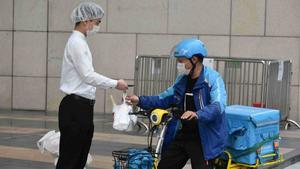 A restaurant employee hands over a food parcel to a Ele.me deliveryman outside a shopping center in Shenzhen, Guangdong province, on March 12. (PHOTO / XINHUA)
A restaurant employee hands over a food parcel to a Ele.me deliveryman outside a shopping center in Shenzhen, Guangdong province, on March 12. (PHOTO / XINHUA)
On-demand food delivery platforms are playing a vital role in helping the catering industry resume normal operations and accelerate its digitalization push, as brick-and-mortar businesses such as restaurants and cafes have been hit hard by the novel coronavirus outbreak.
Statistics from Ele.me and Koubei, a unit of Chinese tech titan Alibaba Group Holding Ltd, said orders and transaction volumes have seen steady growth along with the restoration of normal work and production in various industries.
Takeout orders from more than 80,000 hotpot restaurants across the nation between March 18 and April 6 surpassed levels just before the epidemic began, while sales at over 60,000 dedicated milk tea shops have returned to normal levels or even increased.
The value of third-party online food delivery platforms is more prominent and they have become an antidote to relieve the crisis of offline catering merchants during the contagion period
Chen Liteng, Analyst at the Internet Economy Institute, a domestic consultancy
ALSO READ: Food delivery booming, but patience required as fear over virus grows
Over the period, in terms of in-store purchases, hotpot orders grew tenfold and barbecue restaurant sales jumped nearly sevenfold versus pre-outbreak period.
In addition, on March 18, milk tea maker Nayuki opened an official virtual store on Tmall-the business-to-consumer arm of Alibaba-with followers rising to more than 80,000 as of Thursday.
The catering industry has faced great challenges as a large part of the population have been confined indoors due to restrictions meant to contain the spread of the virus.
Wang Lei, president of Ele.me and Koubei, said the epidemic has greatly accelerated the digitalization push of the services sector, and the Alibaba unit will provide online merchants with more traffic, lower commissions and better services.
The company rolled out a string of measures to help online merchants alleviate pressure caused by the tough situation resulting from the pandemic. It will empower 1 million merchants on the platforms to upgrade their digital solutions, with commission fees to remain 3 to 5 percent lower than the industry average.
They have purchased nearly 40,000 outdoor ads, 100,000 hotel TV ads and 4.8 million internet TV ads in 80 key markets nationwide, all of which will be provided to small and medium-sized catering merchants free of charge, in a bid to help them tide over difficulties.
So far, more than 300,000 merchants have had their commissions slashed, and over 10,000 merchants have received low-interest loans and special subsidies ranging from 5,000 yuan ($707) to 50 million yuan. Over 200,000 businesses have launched food delivery services on the platforms including Quanjude, one of the most celebrated Peking duck restaurants, according to Ele.me and Koubei.
"The value of third-party online food delivery platforms is more prominent and they have become an antidote to relieve the crisis of offline catering merchants during the contagion period," said Chen Liteng, an analyst at the Internet Economy Institute, a domestic consultancy.
Chen said on-demand delivery services guarantee the daily needs of consumers, and the emergence of noncontact delivery and intelligent drop-off shelves efficiently resolved human-to-human contact concerns amid the COVID-19 threat.
Meituan Dianping, another food delivery and lifestyle services platform, said Shenzhen and Guangzhou in Guangdong province; Beijing; Shanghai and Hangzhou, Zhejiang province, were the top five cities with the highest takeout orders since the recent resumption of work and production.
Yang Xu of consultancy Analysys said that as on-site dining at restaurants hasn't fully recovered, third-party takeout platforms are making contributions to the normal restoration of the catering sector and helping mitigate adverse effects of the outbreak.
READ MORE: Take plastic out of food delivery
A report by market consultancy iiMedia Research said that due to the pandemic, total revenue in the country's catering sector plummeted 43.1 percent year-on-year to 419.4 billion yuan from January to February.
About 95 percent of caterers surveyed showed a significant decline in revenue during the outbreak. Third-party food delivery platforms have thus become critical for many merchants, according to the report.


